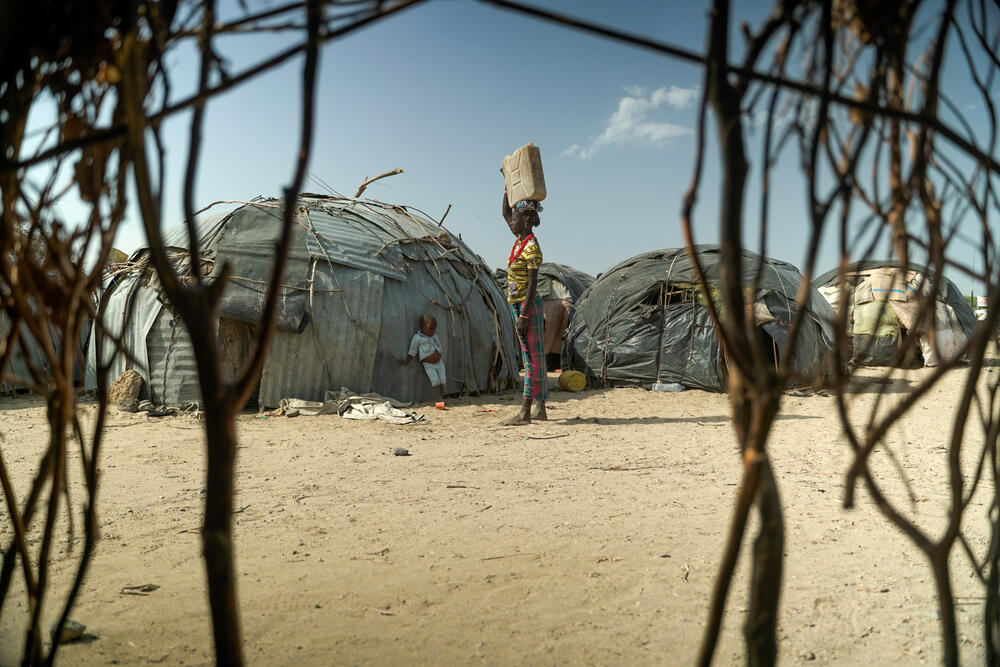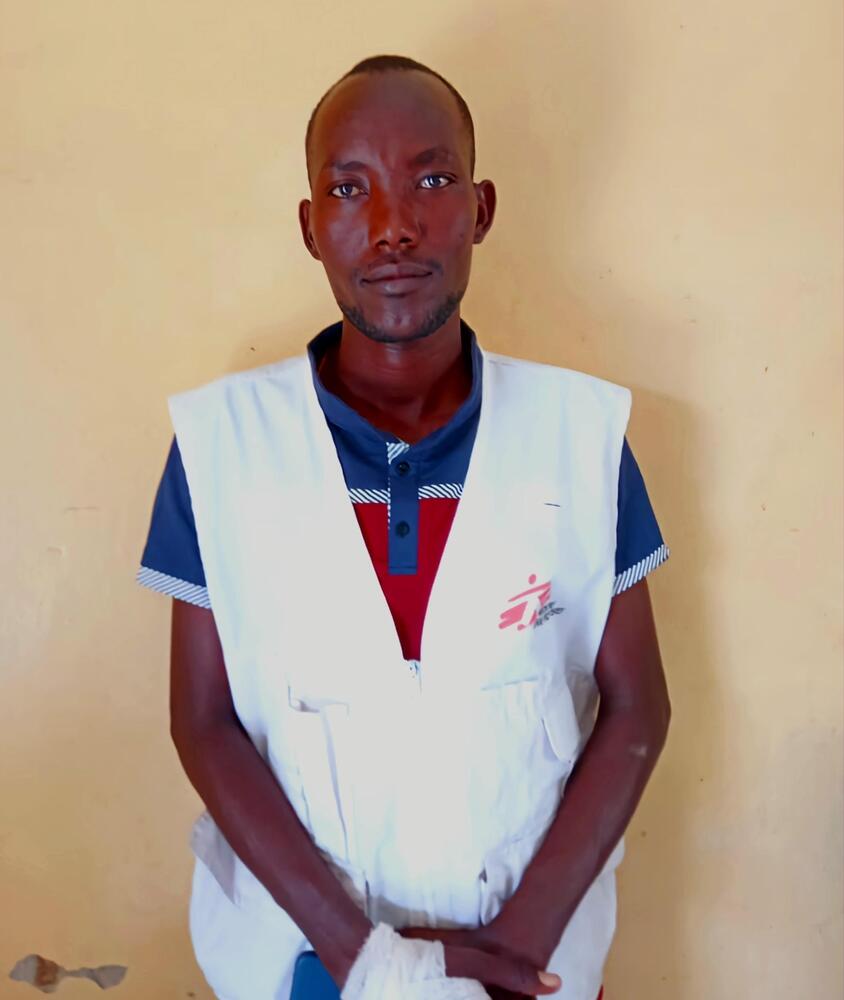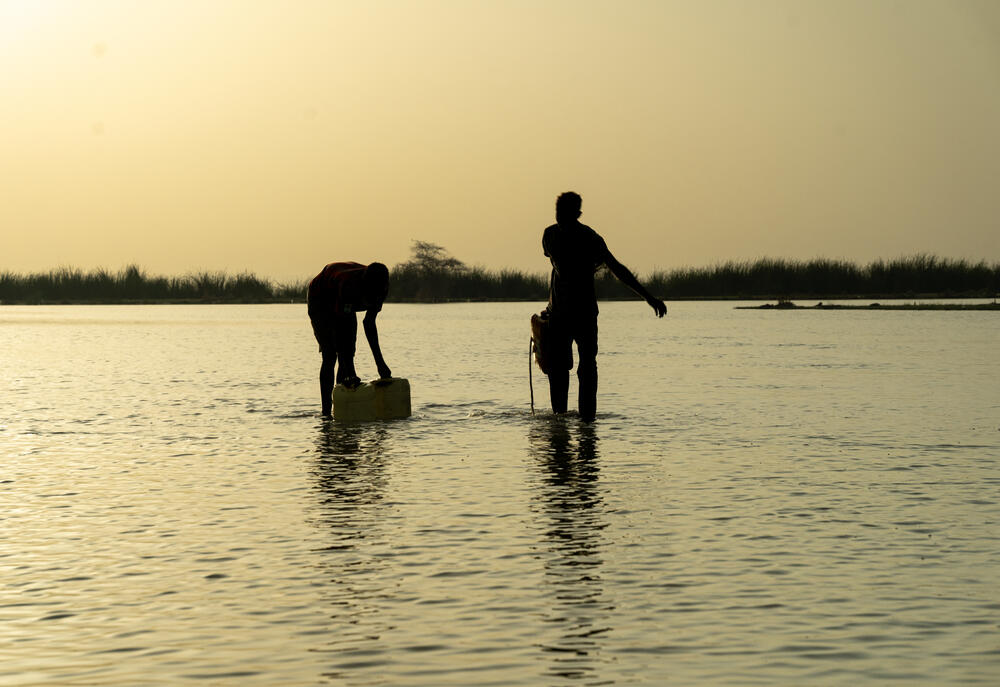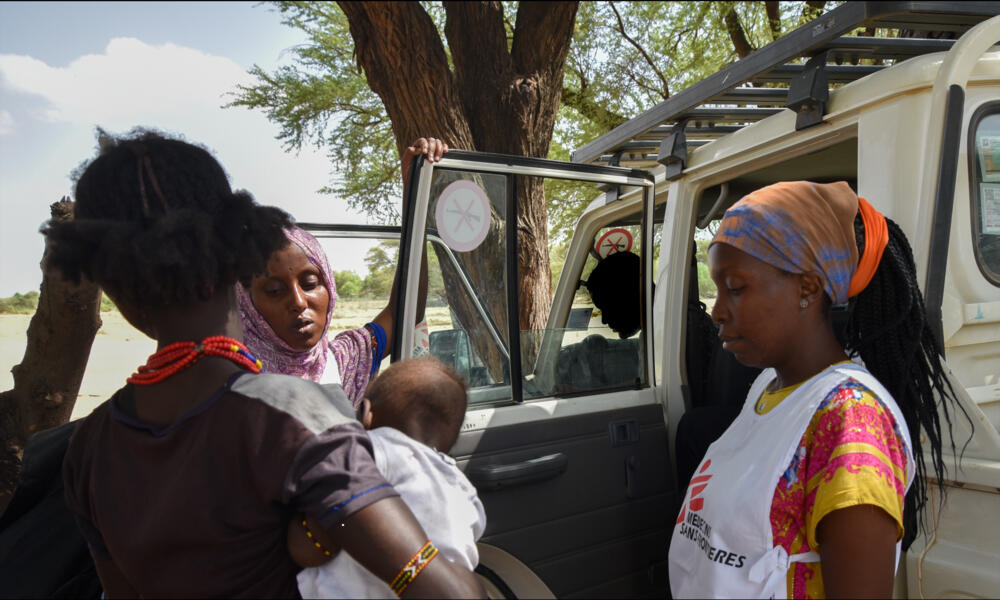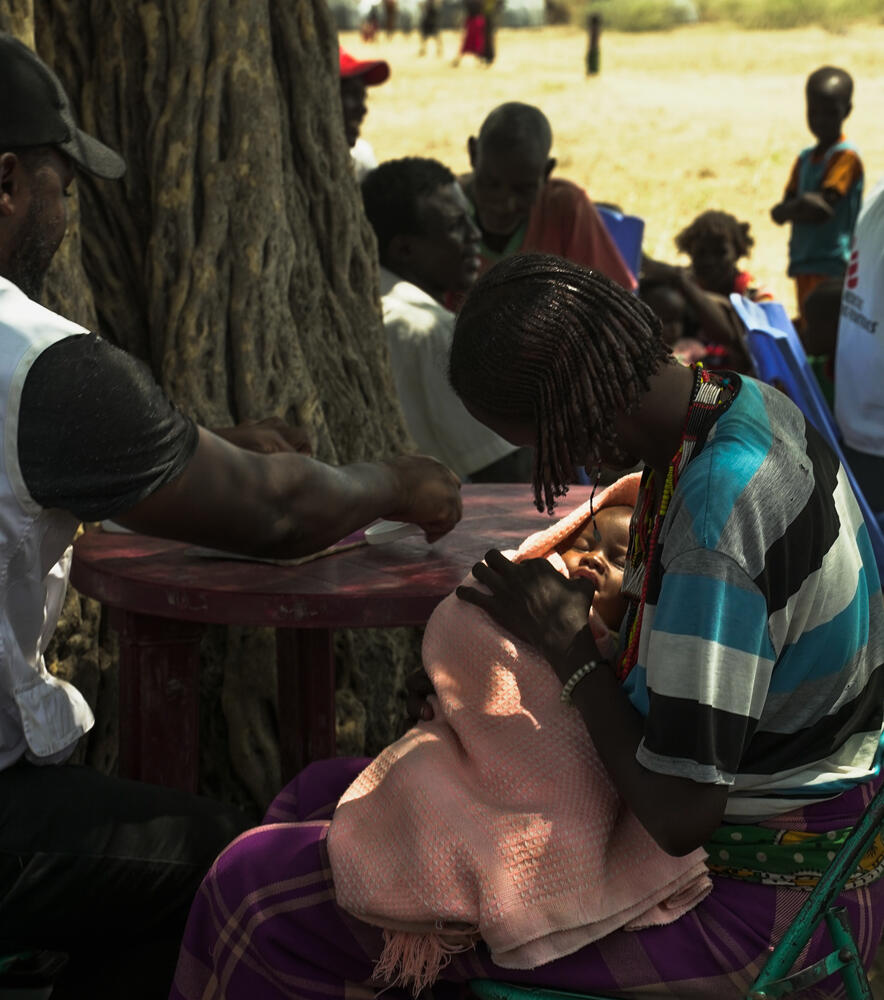"This is the worst drought I have seen in my life": Testimonials from MSF staff in Marsabit County, Kenya
20 January 2023
In northeast Kenya, an ongoing drought is raging following three consecutive seasons of failed rains, making an already dire food insecurity situation worse. Marsabit County is now reporting high rates of acute malnutrition. Here, two MSF community healthcare workers share their stories of detecting and treating malnutrition in Illeret.
Jeremiah Loki is a community health volunteer in Illeret and works with Médecins Sans Frontières (MSF) as an interpreter during the malnutrition response in Illeret ward, Marsabit County in Kenya. Due to high illiteracy rates, most community members in Illeret only speak the local language. With many medical providers being non-locals, the language barrier creates a challenge in health services provision. Interpreters play a huge role in instilling confidence and trust from the community.
Zeitun Yussuf is one of the Médecins Sans Frontières (MSF) community health educators (CHEs) whose work includes carrying out community surveillance and health education. CHE’s are based in the community and have been actively identifying, observing and reporting malnutrition cases from the community. Their work is critical for early detection, enrolment and management of malnutrition cases. She shares her experience as a community health educator and her personal experiences with the drought.
Jeremiah Loki Tete
My name is Jeremiah Loki Tete, I work as an MSF interpreter at the inpatient therapeutic feeding centre. I come from the Daasanach community and have a family with two wives and six children. I have been a community health volunteer at Illeret health centre for a long time, without pay, until MSF recruited me as an interpreter.
This is the worst drought I have seen in my life. Few animals would die in the previous years but this time, it is harrowing. As the Daasanach, animals are the most important possessions for our community. I had over 900 goats, 50 cattle, 10 donkeys, and two camels. All the fifty cattle and two camels have died, I only have 20 goats and two donkeys remaining. Animals are my family’s source of income and food. We buy food from selling our cattle, but now I watch them die helplessly as my family moves them sometimes 100 kilometres away searching for pasture. As a result, my family fully depends on my salary currently. We cannot farm due to the climate here; we buy food across the border in Ethiopia and in Ari.
The rivers have all dried up. We get water 6 kilometres from my house in one of the shallow wells along the riverbeds. It takes at least three hours to make one trip. A one-hour walk to the well, then at least one more hour waiting for your turn, then back. One makes only two trips due to the distance. Children from very poor families are the most malnourished. In the past we would help each other by giving goats or cattle for them to sell and buy food, but we cannot do that now, as we have also lost animals. One of my children had diarrhoea, vomiting and fever mainly due to the quality of water, thankfully, she did not get admitted as we took her for care before it got worse.
When MSF started its malnutrition response, I would volunteer with them at the outreaches. Since I have good knowledge of the community, when MSF needed an interpreter, the facility-in-charge recommended me. I live thirty minutes’ walk from the facility and start interpreting during ward rounds at 8 am. If there are new admissions, I explain the type of care to the caregivers, how to use non-food items like clothes given to the patients and show them around the hospital.
Due to the language barrier and low literacy levels, I help in interpreting dates and explain the complications between the patients and the medical providers. Most of the community members do not know the dates and use key events like rainy seasons to tell dates like the birth of children. My work helps patients understand the type of care, ask questions, feel heard and seen. This translates to more confidence in the care provided by MSF.
The community is now very open and vulnerable with the issues they face, and even refer patients to the hospital. I have learnt a lot of medical terms on malnutrition, translating diagnosis, and measuring weight among others. Most people in the community would not normally go to the hospital and prefer traditional healing methods. Seeing a familiar face at the hospital makes them calm down, accepting this type of care which is foreign to them.
"Beyond language, I interpret the dates of birth of the children using past events."
My community believes in traditional healing methods, and this translates to delayed health seeking. A family once brought a very sick child to the hospital and seeing the needle, they did not want the child to be injected, threatening to leave the hospital. I then challenged them and explained the importance of this care, this transcended the medical terms but was mainly due to trust and the fact that they could trace where I come from. The child got better, and they made the teams aware of other families that had patients in the community.
There should be more consistent health messages, on the importance of early uptake of medical. I ask my community to take their children for vaccinations. Hospitals should not be feared, they help save lives, but taking a sick child or person to the hospital early is the first life-saving act.
Zeitun Yussuf
I am 29 years old, married with two children. I live in Illeret with my family and work with MSF as a community health educator in the malnutrition response. I have always wanted to serve my community. My work includes community surveillance, health education by simplifying medical terms between medical staff and the community while sensitizing the community on hygiene, nutrition and uptake of medical services.
The health messages include malnutrition, balancing locally available foods, supplements and other items like clothes, the community-based outpatient feeding programme, immunizations and vaccinations, use of family planning, and support available for caregivers of children not responding to treatment.
Through health education during outreaches and community meetings, we empower the community and caregivers to facilitate identification and referral of the malnourished children. These caregivers are the focal persons representing the various villages who cascade health information within the community. Explaining to families why not to share the supplements, with added food distribution from other agencies, has lowered the sharing of children’s supplements reducing the malnutrition rates. But this must continue.
"For fast identification of malnutrition, community surveillance and sensitization must continue."
As the drought intensifies, food remains scarce. I witnessed high rates of malnutrition among children in the beginning of the year. Pregnant and lactating mothers do not eat well too, increasing diseases and dependency on relief food. Women sell wood or charcoal to survive- and sometimes they come home late in the evening unable to cook a meal for the family, leaving children home alone most of the time. Besides looking for pasture for their animals, the men sometimes go fishing but have no luck most times.
We do home visits for children who do not respond to treatment (non-responders). These children stay in the nutrition program for a long time mostly because besides the supplements provided, they do not eat. I have seen children sharing supplements and families eating it as the main food, it is disheartening. Few people in the community have identification cards or mobile phones which are main criteria used for the food distributions. When they miss out, families who receive are forced to share what they get – meaning the food is never enough.
Families keep moving looking for pasture for their livestock and water. Sometimes the whole village moves, and if we are unable to trace them, follow-up for non-responders is impacted. Getting water at the shallow well- dug up holes along dry riverbeds is work for the women. My mother, sister and I are lucky as we live two kilometres away from one, taking us at least two hours per trip. With no water treatment available, we use the water as is and boil some for drinking.
Most livestock have died. We sell the remaining livestock to be able to buy food in Ethiopia. The market is twenty-six kilometers away from where I live and is a whole day affair. We must leave at six in the morning, for a slow nine-hour walk to the market with livestock to sell. Most of the animals are weak from hunger, making the journey painfully slow. We then scout for best buyers since the market days are not as promising as before. We buy as much food as we can with the money from the sale, leaving for home around five in the evening with the donkeys carrying the food.
During one of the outreaches, the focal persons alerted us about four children from different villages who were very ill. They had been identified as already dead in the community. We picked them with an MSF car and rushed them to the health facility, where they were admitted for several weeks until they got better and were discharged.
Outreaches enable people who cannot access care, maybe due to distance, or fear of hospitals get early medical attention. Most people here believe that when one goes to the hospital they must be injected- and this is because most come to the hospital when children are in a critical condition and the local remedies have failed. Therefore, community education is still crucial.
Community surveillance and sensitizations must continue to ensure the rates of malnutrition reduce. Early detection, enrolment, management and lowering of malnutrition rates depend on this.
